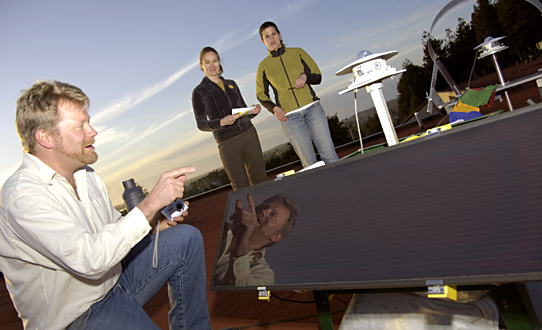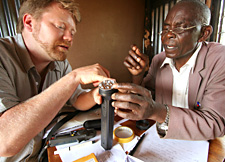
Jacobson, an associate professor in the Environmental Resources Engineering department and an alumnus of Humboldt State, himself, is developing testing protocols that help people in Kenya and Sub-Saharan Africa transition to sustainable energy products.
Millions of Africans who live off the “electrical grid” currently rely on kerosene fuel lamps to light their homes. Kerosene is not only expensive, but also poses significant health and environmental hazards when used indoors.
White light-emitting diodes, known as WLEDs or LEDs are commonly found on headlamps and bicycles in the United States, and are ideal for the developing world because they are portable, bright and run on batteries—ideal for off-grid locations. When charged by solar power, a plentiful resource in sub-Saharan Africa, they emit no pollution or greenhouse gases.

While many people in countries such as Kenya would like to replace their kerosene lamps with solar-powered products or imported LED flashlights and lamps, several barriers have, historically, made that transition difficult.
For starters, new alternative lighting and solar products are quite expensive to the average Kenyan. In addition, very little information exists to help consumers in Kenya and Sub-Saharan Africa determine which of the many imported products are reliable and which are the ones that perform poorly. Making that transition away from kerosene can be, in essence, a gamble in which a sizeable chunk of a family’s income is at stake.
“To most Americans,” explains Jacobson, “an eight dollar LED reading lamp is not a serious investment. If we bought one that didn’t work, we’d just return it to the store and get a new one. It often doesn’t work that way in Africa. Many countries simply don’t have the kind of consumer protection programs that we take for granted. For a family that’s making, say, the equivalent of $1,500 a year, an eight-dollar lamp is a considerable expense. If they buy one that doesn’t work, they can’t just return it and get a new one. It’s an absolute loss.”
Enter Jacobson and his Off Grid Lighting project. Jacobson and partners at UC Berkeley are developing product-testing protocols that can be used to filter out the worthy products from the cheap imitations. It’s important work that could help millions of people in developing countries make the move to sustainable lighting products.
“Professor Jacobson’s work is truly inspiring,” notes Dr. Jená Burges, Humboldt State’s Vice Provost for Academic Programs and Undergraduate Studies. Dr. Burges also serves as Humboldt State’s Accreditation Liaison Officer and was one of the HSU staff members who created the Making a Difference contest—a competition designed to highlight the key goals of Humboldt State’s accreditation efforts.
“Arne is a great example of someone who’s using their education to pursue social justice and environmental responsibility, which our campus community identified as one of the key outcomes of a Humboldt State education. More than anything, though, I’m pleased to see that the Making a Difference contest has helped give a personal dimension to the WASC process. It’s helped people connect the WASC themes directly to their work as faculty, students, staff and graduates of this university.”
Dr. Greg Crawford, Chair of Humboldt State’s Oceanography Department and the Chair of HSU’s WASC Steering Committee, agrees. “That’s it exactly. Re-accreditation takes a long time to complete. At times, it might feel like we’re just going through a process for the sake of the process itself, but that’s not true at all. This is an opportunity for our campus to nail down its goals, evaluate how well it’s meeting those goals, and figure out how we can do an even better job. Seeing these stories of how our co-workers and students are actually out there in the world, making a difference with their education … it brings it all home. What we do here is important and meaningful.”
For his part, Jacobson was surprised when he was notified that he’d been named the winner of the Making a Difference contest. “Well, it’s gratifying to have your work recognized and valued. Of course, the Off-Grid Lighting project isn’t a solo effort. This is definitely a team effort that involves HSU students and my collaborators at Lawrence Berkeley National Laboratory. I was surprised when I got the call from President Richmond telling me about the contest. It feels great.”
Writer Paul Tolme also contributed to this feature.